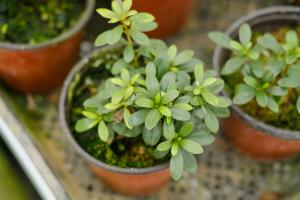Can You Plant Directly in Compost?
Compost, the nutrient-rich soil amendment made from decomposed organic matter, is a popular choice for gardeners looking to enrich their soil and grow healthy plants. But can you plant directly in compost? The answer is a bit complicated.
The Pros of Planting in Compost
One benefit of planting directly in compost is that it provides a rich source of nutrients that can promote healthy plant growth. This is especially true if you have compost that is well-aged and has broken down into a fine, crumbly texture. Compost can also improve soil structure and help retain moisture, which can be particularly helpful in arid climates or areas with sandy soils.
Another advantage is that using compost as a planting medium can reduce the need for synthetic fertilizers or other soil amendments, making it a more environmentally-friendly choice. When compost is used as a mulch or top dressing, it can also help suppress weeds and reduce erosion.
The Cons of Planting in Compost
Despite its many benefits, there are also some potential drawbacks to planting directly in compost. One issue is that fresh, uncomposted organic matter can contain high levels of nitrogen, which can be harmful to some plants. This is particularly true if you are using compost made from materials like grass clippings or manure, which can have high nitrogen content.
Another issue is that compost can be heavy and dense, which can make it difficult for plant roots to penetrate and grow. This is especially true if the compost has not been properly aerated or is too wet. In addition, using too much compost can change the pH of the soil, making it too acidic or alkaline for some plants.
Tips for Planting in Compost
If you decide to use compost as a planting medium, there are some things you should keep in mind. First, be sure to use well-aged compost that has had time to break down into a fine texture. This will help ensure that it is not too nitrogen-rich and that it is easier for plant roots to penetrate.
You should also be careful not to use too much compost. A general rule of thumb is to use no more than 25% compost when amending soil for planting. This can help prevent issues with nutrient imbalances and other problems associated with excessive compost use.
Finally, it's a good idea to test the pH of your soil before planting to ensure that it is within the optimal range for the plants you want to grow. If the pH is too low or high, you may need to add lime or sulfur to adjust it.
Conclusion
In summary, planting directly in compost can be a great way to improve soil fertility and plant health. However, it's important to use well-aged compost, avoid using too much, and test your soil pH before planting to ensure optimal growing conditions for your plants.

 how many times do yo...
how many times do yo... how many planted tre...
how many planted tre... how many pine trees ...
how many pine trees ... how many pecan trees...
how many pecan trees... how many plants comp...
how many plants comp... how many plants can ...
how many plants can ... how many plants and ...
how many plants and ... how many pepper plan...
how many pepper plan...































